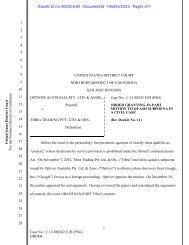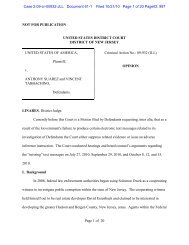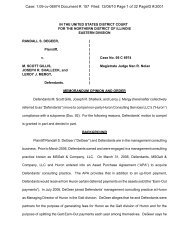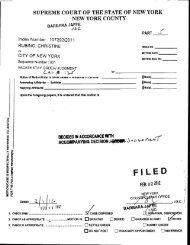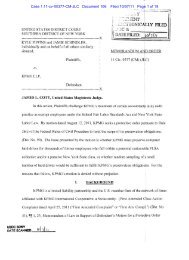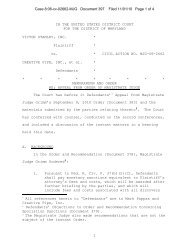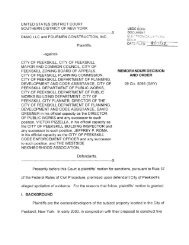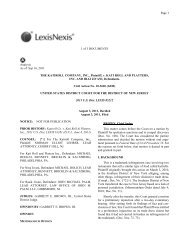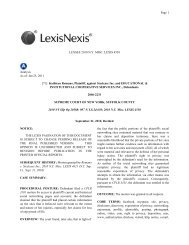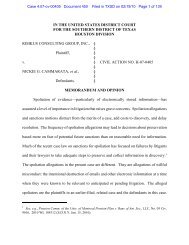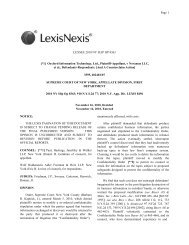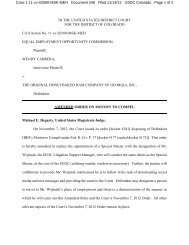SANCTIONS FOR E-DISCOVERY VIOLATIONS: BY THE NUMBERS
SANCTIONS FOR E-DISCOVERY VIOLATIONS: BY THE NUMBERS
SANCTIONS FOR E-DISCOVERY VIOLATIONS: BY THE NUMBERS
Create successful ePaper yourself
Turn your PDF publications into a flip-book with our unique Google optimized e-Paper software.
826 DUKE LAW JOURNAL [Vol. 60:789<br />
whether the court relied on the rule in making its decision. 159 The half<br />
case is a decision in which the court held that Rule 37(e)’s safe harbor<br />
would protect a party from potential sanctions for some conduct prior<br />
to notice of litigation, but that it would not protect the party from<br />
potential sanctions for other conduct after notice. 160<br />
Courts have not shown a propensity to give the safe harbor<br />
broad and ready application. One court cited the rule at the outset of<br />
a case, warning the parties to be cautious in relying on its<br />
protection. 161<br />
In another case, the court cited the rule but deferred<br />
consideration of sanctions. 162 In twelve decisions, the court denied the<br />
safe harbor, with many courts finding that the post-notice destruction<br />
of evidence was not within the protection of Rule 37(e). 163<br />
Among<br />
159. In re Kessler, No. 05 CV 6056(SJF)(AKT), 2009 WL 2603104, at *3 (E.D.N.Y. Mar. 27,<br />
2009) (appearing to apply Rule 37(e) sub silentio to reject an award of attorneys’ fees based on<br />
the party’s failure to preserve video footage which “self-destructed” approximately twentyseven<br />
hours after it was recorded “in accordance with the routine operation of<br />
the . . . surveillance system”); Riverside Heathcare, Inc. v. Sysco Food Servs. of San Antonio,<br />
LP (In re Riverside Healthcare, Inc.), 393 B.R. 422, 429 (Bankr. M.D. La. 2008) (refusing to<br />
award sanctions when the absence of the requested email did not unfairly prejudice the<br />
opposing party and when the email was deleted routinely before the suit).<br />
160. Peskoff v. Faber, 244 F.R.D. 54, 60–61 (D.D.C. 2007) (noting that sanctions are<br />
possible for the failure to disable an email auto-deletion function during the period following<br />
notice of pending litigation, but are not appropriate for failure to do so prior to notice of<br />
pending litigation).<br />
161. Oklahoma ex rel. Edmondson v. Tyson Foods, Inc., No. 05-CV-329, 2007 WL 1498973,<br />
at *6 (N.D. Okla. May 17, 2007) (admonishing the parties, in a case with voluminous ESI, to “be<br />
very cautious in relying upon any ‘safe harbor’ doctrine as described in new Rule 37(f)”).<br />
162. U & I Corp. v. Advanced Med. Design, Inc., No. 8:06-CV-2041-T-17EAJ, 2007 WL<br />
4181900, at *6 (M.D. Fla. Nov. 26, 2007) (construing Rule 37(f) as “govern[ing] a parties’ [sic]<br />
failure to cooperate during discovery” and deferring consideration of sanctions pending the<br />
responding party’s submission of an affidavit of a corporate representative explaining why<br />
certain emails were not available and detailing the efforts it made to obtain them).<br />
163. KCH Servs. Inc. v. Vanaire, No. 05-777-C, 2009 WL 2216601, at *1 (W.D. Ky. July 22,<br />
2009) (granting an adverse-inference jury instruction when the defendant ordered employees to<br />
delete certain software and evinced an “unwillingness to place a meaningful litigation hold on<br />
relevant electronic information after being placed on notice”); Stratienko v. Chattanooga-<br />
Hamilton Cnty. Hosp. Auth., No. 1:07CV258, 2009 WL 2168717, at *4, *7 (E.D. Tenn. July 16,<br />
2009) (awarding attorneys’ fees to the plaintiff as a sanction after the defendant hospital<br />
reimaged the chief of medical staff’s hard drive immediately after the chief’s retirement and<br />
long after the hospital was on notice that electronic information on the hard drive could be<br />
relevant to the lawsuit); Ripley v. District of Columbia, No. 06-1705, slip op. at 9 (D.D.C. July 2,<br />
2009) (holding that Rule 37(e) afforded no protection to a defendant that destroyed emails and<br />
denied the existence of a back-up tape after the plaintiff requested the emails and awarding<br />
attorneys’ fees as a sanction because “[d]efendants . . . did not operate their e-mail system in a<br />
routine, good-faith manner”); Phillip M. Adams & Assocs. v. Dell, Inc., 621 F. Supp. 2d 1173,<br />
1191–92 (D. Utah 2009) (holding that the safe harbor was not available because the defendant<br />
discarded computer source code and failed to show reasonableness or good faith); Technical



